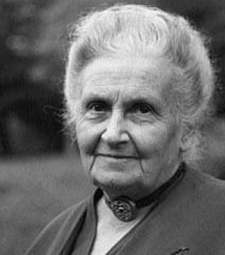
A native of Chiaravalle in Italy, Maria Montessori was born in 1870 and was the first Italian woman to qualify as a physician. Despite numerous hurdles, she went on to become the first female doctor at the Rome University Psychiatric Clinic. Here she discovered her interest in children’s learning and developed a philosophy of education that is known today as the Montessori Method of education. As a young woman, she recognised the potential of early education in transforming societies and established her first school, the Casa Dei Bambini, in 1907. Due to the positive impact it had on both the children involved and their families, it caused an enormous interest among the public.
The children’s progress in Montessori setup, both socially and intellectually, surprised her just as much as everyone else and made her realize that she had found something unique about their learning abilities. Eventually, she devoted her life to the Montessori movement. She became internationally famous for her educational work and her efforts to promote harmony through social and moral reform. She was nominated three times for the Nobel Peace Prize.
What is Montessori?
Montessori is an educational philosophy that applies to children of all ages, from birth to adolescence. It is based on observing children’s needs in different cultures all around the world. It was nearly a century ago; Dr Maria Montessori developed this approach based on her understanding of children’s learning abilities in “prepared environments” among diverse age groups (0-3, 3-6, 6-9, 9-12, and 12-14).
The Montessori environment is specially designed with manipulative “materials for development,” which encourages children to choose learning activities based on their own curiosity. Under the supervision of a trained teacher, children in the Montessori environment learn to cultivate, concentration, motivation, self-discipline and a sense of wonder for learning.
Founded in 1929, the Association Montessori Internationale (AMI) has maintained educational principles and spread Montessori education across the globe. Montessori environment makes children exceptionally adaptable. Having been equipped with the skills of problem solving and time management from an early age, these children are able to make appropriate decisions at the right time. In addition to working independently, they also learn to work in groups.
When such students are encouraged to share their ideas and work freely with others, their good communication skills help them ease the transition into new settings. Children who participate in Montessori programs through autonomous, non-competitive activities develop a positive self-image and the confidence needed to accept challenges and changes of the future.
